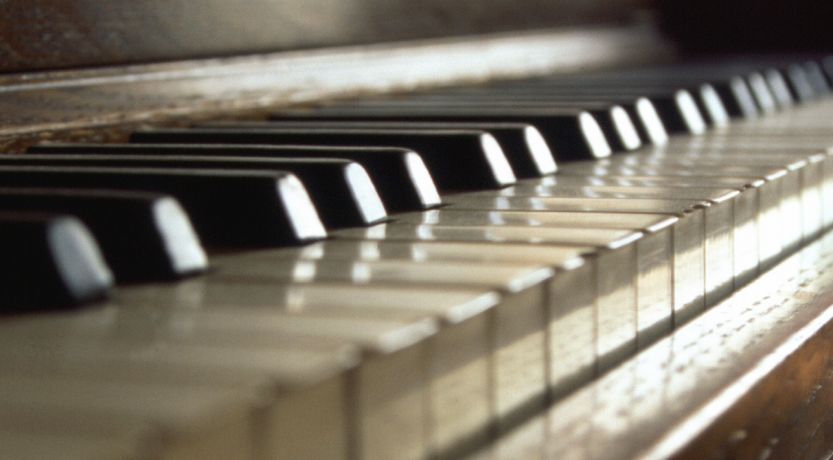Does a verse in Amos prohibit the use of musical instruments in church worship services? What does the Bible say about music and musical instruments?

For many people, church services tend to be rather quiet and subdued. Others attending another church enjoy contemporary music provided by a group of musicians playing guitars, trumpets, tambourines and drums.
On the one hand, music can be very comforting and relaxing; on the other, it is often the source of disagreements and arguments. Everyone has an opinion of what good music is. Each generation tends to embrace its own music. The music Grandpa listened to is considered tame by his grandchildren, although his own parents thought he was on the road to degradation—that he was simply being rebellious.
Not surprisingly, the controversy over music has crept into worship services the world over. One church attempts to attract worshippers with a full music program, while down the street another church includes music in its services only by singing a cappella.
What the Bible says about music
Even a cursory investigation of the Bible will show that music and musical instruments were used in various aspects of the lives of the ancient Israelites, including their worship of the true God.
There were times when the first king of Israel, Saul, was overtaken by a distressing spirit and his advisers suggested that David be brought to the king to play the harp and give him relief (1 Samuel 16:14-23).
Even a cursory investigation of the Bible will show that music and musical instruments were used in various aspects of the lives of the ancient Israelites, including their worship of the true God.
God didn’t allow King David to build the temple, the house of God (1 Chronicles 28:3). But David was allowed to prepare the plans for the temple and its worship services—and they were very detailed. He arranged to have players of harps accompany singers. Trumpets, cymbals and “stringed instruments” were also employed in the worship service (1 Chronicles 15:16; 16:42; and 25:1).
For some time the Ark of the Covenant had been stored at the house of Abinadab. David and 30,000 men went to Baale Judah to escort the Ark to Jerusalem. As this impressive procession made its way to Jerusalem, it was accompanied with music played on “all kinds of instruments of fir wood, on harps, on stringed instruments, on tambourines, on sistrums, and on cymbals” (2 Samuel 6:5).
After David’s son Solomon built the temple, the priests installed the Ark in the Most Holy Place. Some were singing by the altar while others were playing “cymbals, stringed instruments and harps” and 120 priests played their trumpets. Cymbals and other musical instruments were involved in offering praise to God. And God was certainly not displeased (2 Chronicles 5:11-14).
When Ezra and Nehemiah later repaired the fallen walls in Jerusalem, there was a joyful dedication with singing and different musical instruments adding to the festivities (Nehemiah 12:27).
There are dozens and dozens of scriptural references, from Genesis to Revelation, regarding who we should worship and when and where we should worship, but there is scant evidence as to exactly how we worship. However, we do know they bowed, they prostrated themselves, they praised God, they gave offerings and they sang and played songs of praise to God.
A misunderstood scripture about music
Today churches are the locations where believers of like minds congregate to be instructed in God’s ways. In 2001, the World Christian Encyclopedia identified 10,000 distinct religions and 33,820 denominations (David B. Barrett, George T. Kurian and Todd M. Johnson). Those denominations often have differing and very distinct rituals for their worship.
It is not surprising there would be different beliefs regarding the use of musical instruments in church worship services. Sometimes these worship traditions come from misunderstanding scriptures or reading them out of context.
For example, some churches have quoted Amos 6:5 (“Who sing idly to the sound of stringed instruments, and invent for yourselves musical instruments like David”) to prove that instruments should not be used in worshipping God.
If this section of Scripture is read in context, that argument fails. Amos’ warning was to the complacent and prideful people of Israel and Judah who were enjoying leisure, including music, while forgetting God and disobeying His laws. Their coming doom was because of sin, not because they aspired to create instruments like David, Israel’s greatest king and musician, had.
A noted scholar in the Churches of Christ, Jack P. Lewis, took exception to the use of Amos 6:5 in this issue by pointing out what is written in 2 Chronicles 29:25. When King Hezekiah repaired the house of the LORD he appointed musicians: “And he stationed the Levites in the house of the LORD with cymbals, with stringed instruments, and with harps, according to the commandment of David, of Gad the king’s seer, and of Nathan the prophet; for thus was the commandment of the LORD by His prophets.”
Putting these two sections of Scripture together, we can see that God was not displeased that David called for musical instruments to be used in the temple; in fact, God told him to do so!
God enjoys music
Man has always expressed emotions through vocal and instrumental music. We glean from the Scriptures that God also enjoys music.
God says in Psalm 50:23, “Whoever offers praise glorifies Me; and to him who orders his conduct aright I will show the salvation of God.”
The 150th Psalm explains some of the ways we can praise God: “Praise the LORD! Praise God in His sanctuary; praise Him in His mighty firmament! Praise Him for His mighty acts; praise Him according to His excellent greatness! Praise Him with the sound of the trumpet; praise Him with the lute and harp! Praise Him with the timbrel and dance; praise Him with stringed instruments and flutes! Praise Him with loud cymbals; praise Him with clashing cymbals! Let everything that has breath praise the LORD. Praise the LORD!” (Psalm 150:1-6).
The apostle Paul also shows the importance of music in the New Testament Church: “Let the word of Christ dwell in you richly in all wisdom, teaching and admonishing one another in psalms and hymns and spiritual songs, singing with grace in your hearts to the Lord” (Colossians 3:16).
God requires us to “worship the Father in spirit and truth” (John 4:23-24). The Bible does not require musical instruments in church for worship services, but musical instruments are certainly not prohibited.
Read more about music in the Bible in the article “Songs of Praise.”





